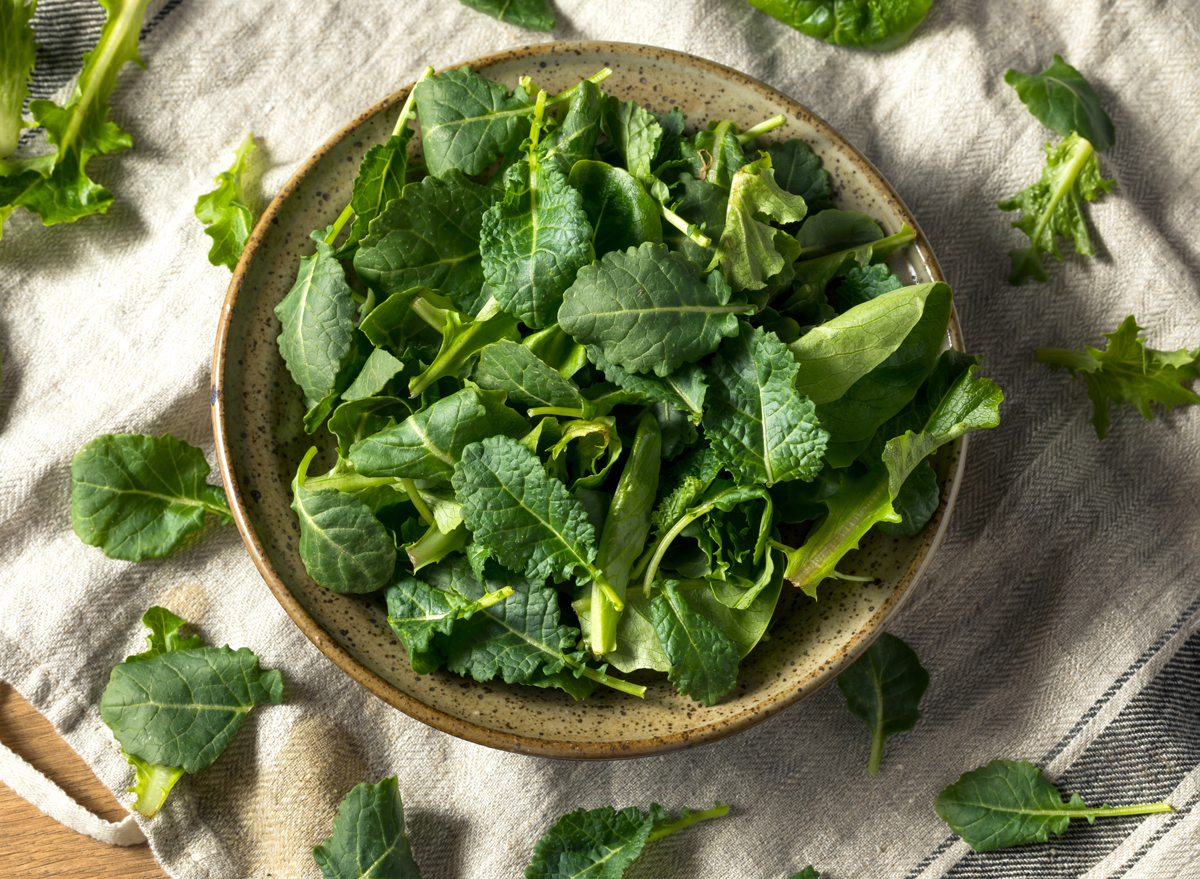One Major Side Effect of Eating Leafy Greens, Say Dietitians

First things first. Leafy greens are darn good for you. Collard greens, spinach, beet greens, watercress, kale, arugula, chard, romaine, broccoli, bok choy, the list goes on. And whether they’re in a salad or soup, stir-fry or sautéed, we love ’em all. (For more on the best of the bunch—pun intended—check out our guide to the healthiest types of lettuces and leafy greens.)
“Most people really benefit from eating more leafy greens. They’re nutrition powerhouses, loaded with not only vitamins and minerals like vitamins A, C, K, and many B-vitamins like folic acid, but they’re also high in fiber,” says Keith-Thomas Ayoob, EdD, RD, FAND, Associate Clinical Professor Emeritus, Department of Pediatrics, at Albert Einstein College of Medicine, in New York, New York. “People eating lots of leafy greens also reduce their risk for conditions like constipation, obesity, heart disease, hypertension, and diabetes,” he continues, adding that while all vegetables are good to eat, he considers leafy greens some real standouts.
However, if you’re big on spinach in your smoothies, kale as the base for your lunch salad, and collards on your dinner platter, it’s important to be aware of some potential risks of eating leafy greens in excess. Worth noting: For further insight on whether overeating leafy greens may be a concern for you, always consult with a nutritionist or your doctor since various medications and conditions may impact the amount that’s safe for you to consume.
READ MORE: One Major Side Effect of Eating Chia Seeds
Before we dive into that, a brief overview of vitamin K, which leafy greens are rich in: “Vitamin K comes in two forms in food; K1 (phylloquinone) and K2 (menaquinone). Vitamin K1 is in plant sources like dark leafy greens and vitamin K2 is found in animal foods and fermented plants,” offers Trista Best, MPH, RD, LDN, at Balance One Supplements. She notes that a deficiency in vitamin K can cause excessive bleeding, and it is also linked to low bone density.
On the flip side, too many dark, leafy greens, can be bad for you as well, and this relates to their vitamin K content, too. “Vitamin K is a fat-soluble vitamin essential for proper blood clotting and making proteins necessary for bone health. Vitamin K, which is found in abundance in leafy greens, is fat-soluble. This means it can become toxic when too much is consumed or supplemented,” says Best. The average daily recommended amounts of vitamin K for adult men 19 years and older is 120 micrograms and for adult women 19 years and older it’s 90 micrograms.
If you take blood thinners, it’s also important to pay attention to your leafy greens intake as eating a large amount of leafy greens increases your levels of vitamin K, which acts as a blood thickener, says Diana Gariglio-Clelland, RD, CDCES, a certified diabetes care and education specialist and registered dietitian with Next Luxury.” People taking blood thinners such as Warfarin (Coumadin) need to keep their intake of vitamin K consistent to ensure their blood thinners work effectively to reduce the risk of a blood clot,” comments Gariglio-Clelland. “Changing the amount of leafy green vegetables consumed day-to-day for people on Coumadin may increase the risk of blood clots or increased bleeding. It’s fine to eat leafy green vegetables while on blood thinners, but the most important element is to keep the intake consistent,” she continues, referencing this study.
Bottom line: Leafy greens can be a boon for your health. To reiterate, they’re loaded with vitamins and help reduce the risk of chronic disease like diabetes and heart disease. “They’re also rich in antioxidants that can help fight inflammation and may reduce the risk of certain cancers and[are] low in calories and carbohydrates, meaning they provide these nutrients without impacting the caloric or carbohydrate levels of people wanting to manage their weight or blood sugar levels,” offers Gariglio-Clelland. But because of potential complications that vitamin K presents, it’s important to stick to the average daily recommended amounts of this nutrient, and talk to a doctor or nutritionist if you’re worried about bone health, pharmacological interactions, or anything else. And if you’re a big fan of spinach, read about this One Major Effect Eating Spinach Has on Your Gut, New Study Says.
For more healthy eating news, make sure to sign up for our newsletter!








